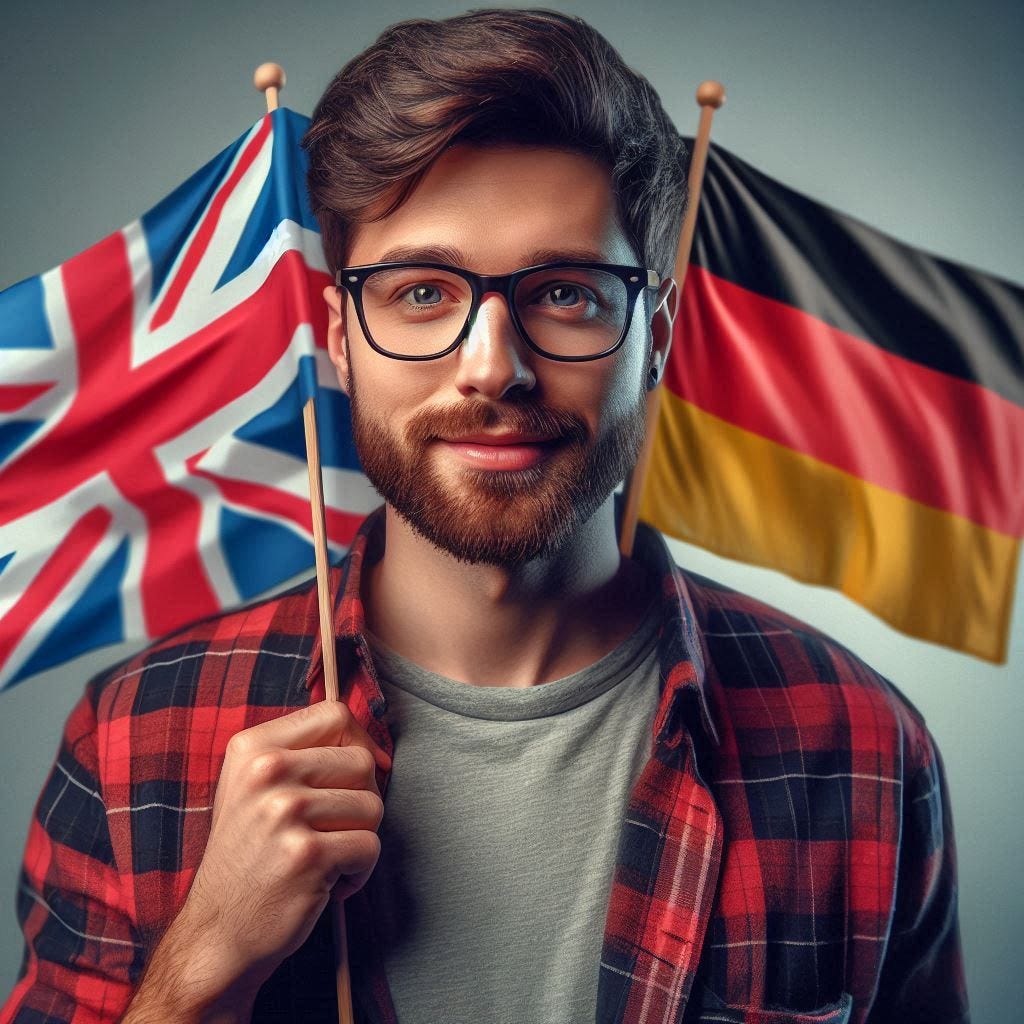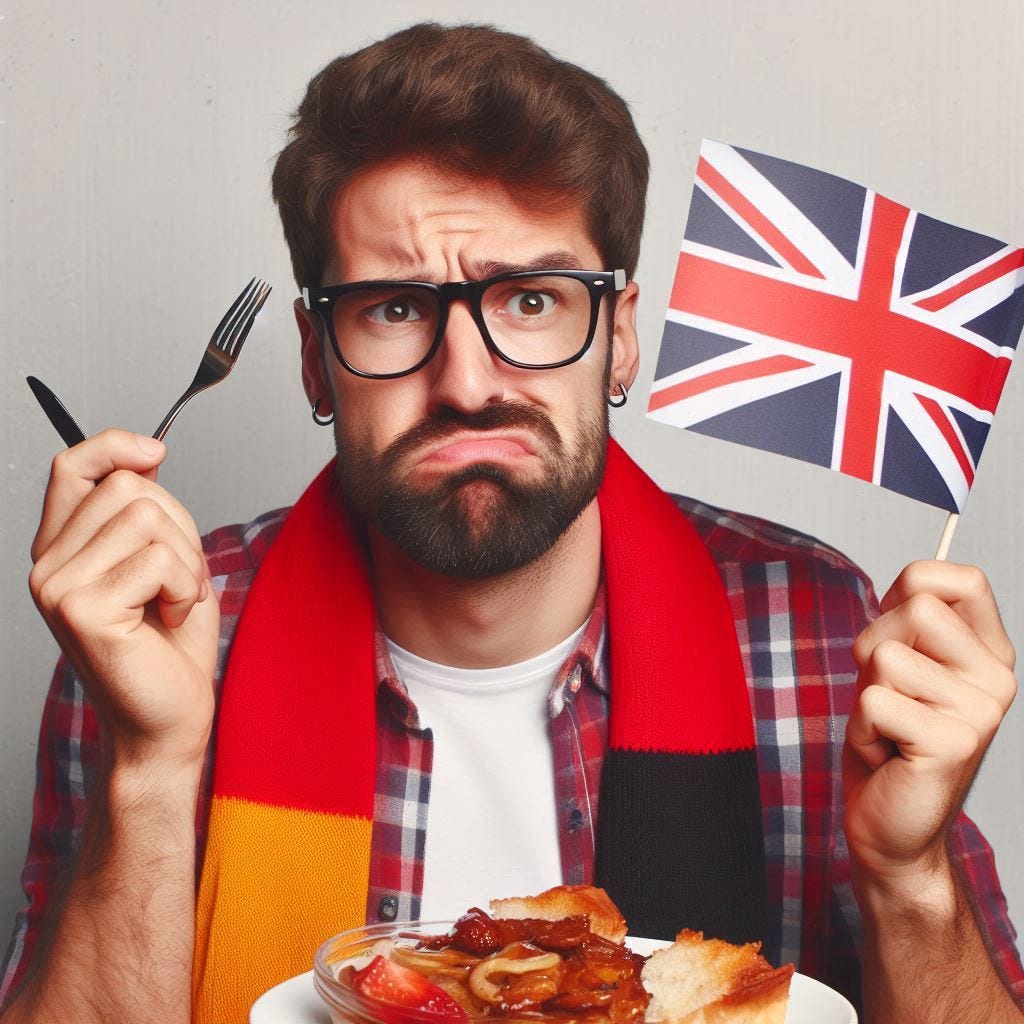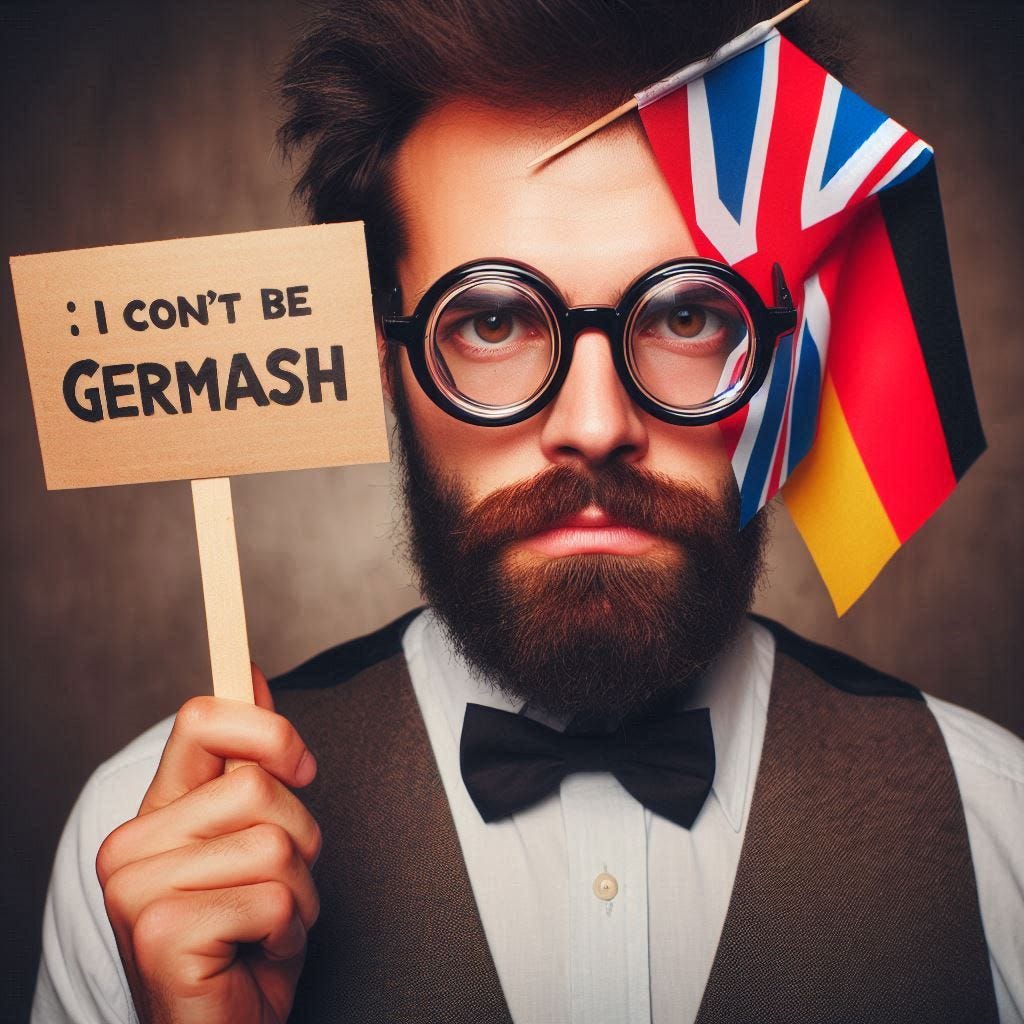I was always German on the inside. I knew that much as a kid. I just had the misfortune to be born in provincial northern England.
I jest of course. My strong desire to leave the UK and live in Germany, which was clear to me from my teens onwards, was actually borne out of a complex mix of factors. I didn’t have a German soul trapped in an English body. In some of the circles I later mixed in, I discovered that it’s actually not unusual for intelligent young gay men who’ve grown up somewhere dull and monocultural to become fixated on a particular European country and want to learn the language and live there. Once I went on a dinner date with a Serb who spent the entire meal talking about how much he loved Finland. My best friend and I used to hang out from time to time with a guy called Joel who was obsessed with Sweden (a particularly popular choice). “I think I must have been Swedish in a past life!” Joel exclaimed once. “No, you’re just gay in this one,” my friend replied. There’s no mystery here: Straight male nerds do it with Japan. Straight girls do it with Korea. American women do it with Italy. Gay men do it with a raft of European countries. (And in all cases, pop culture and romantic inclination are big driving factors.)
After five years of German in high school and two years of taking it as a minor at university, I was extremely well-prepared when I first arrived in the country in 2003 for my Erasmus year. People were impressed at how good my German was; I immediately fit in and found myself far more socially accepted than I’d ever felt in the UK, and not just among one group. While other foreign students only hung out with fellow internationals, I completely assimilated. I was living with Germans (and a few Ukrainians) in student accommodation, working with Germans and Indians in a university science lab, and hanging out socially with a group of party-hard German guys in their late twenties who were mostly business and engineering students. (Years later, long after I’d graduated and moved back to Germany permanently, they even bizarrely brought me to their high-school reunion.) I was obsessed with passing, seeming as native as possible. I pulled it off. Cis-Germans constantly complimented me and made me feel like one of them. Everyone clearly knew I was English but treated me not just like a German but like a local. A few months in, I started dreaming in German.
The elephant in the room here is the UK’s class system. Why was I so much more accepted in Germany than in the UK? Not just because Germans are great (although they are), but because of the UK’s strange social quirks, its roiling cauldron of subtle linguistic demarcations and resentments, as documented expertly by Kate Fox in Watching The English. Having a northern English accent caused me to be looked down on by posh kids (mainly the girls) and newly middle-class larpers (no-one polices class boundaries more keenly than those whose class status is the most insecure) every time I opened my mouth. Even at the age of 5 I’d been mocked at school by classmates and the teacher for my perfectly normal Cumbrian accent, one that sounded out of place growing up in a town two hours from Cumbria (yet still firmly within northern England). In my first two years at a Russell Group university in the UK, the boarding-school kids didn’t know what to make of me. I wasn’t on the receiving end of any accent-based bullying experiences of the kind regularly documented in articles like this one, but I didn’t fit in at all. I didn’t naturally belong in any social class. In Germany, there was no accent-based class system, and I immediately belonged.
I intended to stay in Germany forever. I hated being clocked as British. The only microaggressions I ever got weren’t from Cis-Germans but from fellow Trans-Germans, other migrants who’d been in Germany for longer than me and wanted to make clear their relative position in the pecking order. I drank Almdudler. I went to the beer festival and to vegetable-themed street parties. I watched MDR and clapped to the beat. I used German toilets. I had white asparagus for lunch in Karstadt with all the old ladies. I had sex in German. I recorded Nightwash from WDR on my DVR because I have a GSOH. I separated my trash and returned my bottles. I shopped in Kaufhof and Peek & Cloppenburg and dressed in a typical German smart-casual style, never more so than when back visiting the UK. One Christmas I walked into a branch of Poundland in one of those grim northern English towns where most people wander around in tracksuits, and the girl on the checkout told me I looked “all professory”. In 2007, when my dad applied for and successfully obtained Irish citizenship, I fantasized about doing the same (which I did two years later) and giving up my British passport (which, for obvious reasons of sanity, I never did). It wasn’t that I felt Irish - I’d spent hardly any time there. It was that I strongly disidentified with being British.
But I wasn’t German.
It started with the little things. My frustration at Sunday closing - the fact that all stores in the country, except for those in airports, train stations and gas stations, were closed all day every Sunday. When I’d first arrived in Germany in 2003, this was a novelty, something that I assumed was a religious relic that would soon be corrected - after all, the UK had liberalised its own Sunday trading laws less than a decade earlier. Little did I know that over twenty years later, Germany and Austria would still be almost the only remaining countries in Europe where stores are barred from opening on Sundays, with no sign of this ever changing.
That wasn’t the only ban. I started to realise that more and more things I’d never encountered in Germany were absent precisely because they were banned or discouraged. Like laser tag. Until 2012, there were no long-distance buses between cities - like Greyhound in the US or National Express in the UK - because this was illegal “in order to protect the monopoly of Deutsche Bahn”. Even in supermarkets, multi-buy offers of the kind common in the UK - like buy-one-get-one-free - were against the law as they “encouraged overpurchasing”.
Then they banned major-label music videos on YouTube. You couldn’t watch Lady Gaga or Rihanna anymore because they were blocked due to a legal dispute that went on for years. You couldn’t watch Jessie J either. For that, at least, I was thankful.
I missed British supermarkets. British television. Sandwiches. Bounty bars. Charity shops. Lockets. Crumbly cheese. And being able to function in my native language on a day-to-day basis rather than doing everything in a second one that would never sit quite as comfortably. For one thing, I wasn’t as funny in German. And people kept thinking I was a tourist. There was nothing I could do about this, but it bothered me more the longer I’d been in the country. They hear an English or American accent and assume you’re there on holiday.
As I was already in the process of detransitioning and moving back to the UK, something strange happened. Germany - already diverse - became one of the biggest destinations for migrants in the world, but without any of the selectivity or entry rules of other popular migrant destinations like America. As word spread that Germany had porous, almost totally unpoliced borders with nine other countries and would allow entry to almost anyone who claimed asylum (and pay them benefits that were higher than the average wage in their home country even if their claim was rejected), millions of people in the Middle East and North Africa suddenly developed Rapid-Onset German Desire (ROGD). It didn’t matter that I was a true Trans-German who’d done everything I could to learn the language, follow the rules, respect the host society and fit in seamlessly. The new state policy essentially became anyone who wants to be German can be German, and if you disagreed with this, you were xenophobic. It was made far easier to become a German citizen. You didn’t even need to have facial Germanization surgery anymore. (After all, no-one wants to look like Klaus Kinski.) There were even dark rumors of mothers in countries like Sierra Leone and Tajikistan forcing their children into lederhosen and calling them Reinhardt. Dealers in Djibouti selling dirndls on the dark web. Merkel had started something she couldn’t control. Shortly before I left, a Syrian refugee in the gym asked me to feel his abs. Reader, they were hard.
The reason I loved German-speaking Europe was simple: it seemed like a better place. In many ways, it was. As an English kid in the 90s, going on regular summer holidays to Switzerland and Austria from the age of 9 showed me a completely different world - a beautiful, functional, affluent society where I felt I could be me. Where people looked each other in the eye, shook hands when they met and treated each other decently, and which wasn’t riven with passive-aggressive class conflict and permanently rainy and overcast like the UK. Everything just worked. I knew my future was there and couldn’t wait to leave.
But was there not also a certain element of autoGermanophilia (AGP) in my teenage self? Was my desire to turn Teutonic at its core a sexual fetish? I can’t deny there were things about German pop culture that spoke to me on that level, but then the same goes for a girl who develops an interest in South Korea because of BTS or a straight weeb whose fascination is triggered by kyute anime girlies. The truth is: I never went all the way. One appointment in Munich with a surgeon who proposed replacing my genitals with a Bavarian weißwurst and two Mozart balls was enough to send me running for the hills.
In 2013, towards the end of my decade-plus in Germany, the UK parliament passed same-sex marriage. A few months later, when the issue was being debated on German TV, Merkel said she was against it due to her “child well-being concerns”. The following year, a gay politician from Merkel’s party who was arguing in favor of same-sex marriage was captioned on state television as an “avowed homosexual”. When footballer Thomas Hitzlsperger came out, a popular newspaper ran an article helping male readers who were worried that they too might “suddenly turn gay” to “spot the signs”. Germany had seemed more gay-friendly than the UK when I arrived, but had the script flipped?
Or was this - like the Sunday opening laws, the widespread use of fax machines, longstanding internet woes and various other things - just a symptom of stalling progress on multiple fronts? The same had happened in terms of technology too. Germany used to be seen as high-tech until at least the 1990s and 2000s, but now when it came to digital, everything worked better in the UK. And when I went to Poland, Denmark or the Netherlands, things were simpler and more efficient there too when it came to payment, travel and automation. In Germany, putting coins and notes in a machine in return for a printed paper ticket was still the norm when the Netherlands had long since switched to a nationwide smartcard system and Poland’s poorest cities had retrofitted their trams with contactless payment. You couldn’t even purchase basic medications like paracetamol (tylenol) in Germany without first being questioned by a pharmacist. In most of the rest of Europe, you could just buy it at the counter or in a supermarket.
So now, in 2025, what am I? How do I see myself? Was my time in Germany just a delusion, a mirage? Nah: it’s an essential part of me. I still use German constantly in my professional life. As a non-binary European, I reject the notion of being either solely British or German. I dip in and out of Austrian radio, German TV and German Twitter to keep abreast of what’s going on there, even if I haven’t been in Germany since 2018 or Austria since 2021. And I see a growing convergence: the UK is making many of the same mistakes Germany has when it comes to freedom of expression, law and order, and migration. But me? I won’t be affected by any of that.
Because I looked deep inside my soul, and guess what?
I’m trans-Danish, for helvede.








I think you are on to something. For me and many American gay boys, it was France.
Almdudler war definitiv die falsche Wahl. Echter Deutscher ist man erst nach einer halben Flasche Fürst Uranov für 4,99 € - garniert mit ein paar Kurzen "Ficken".